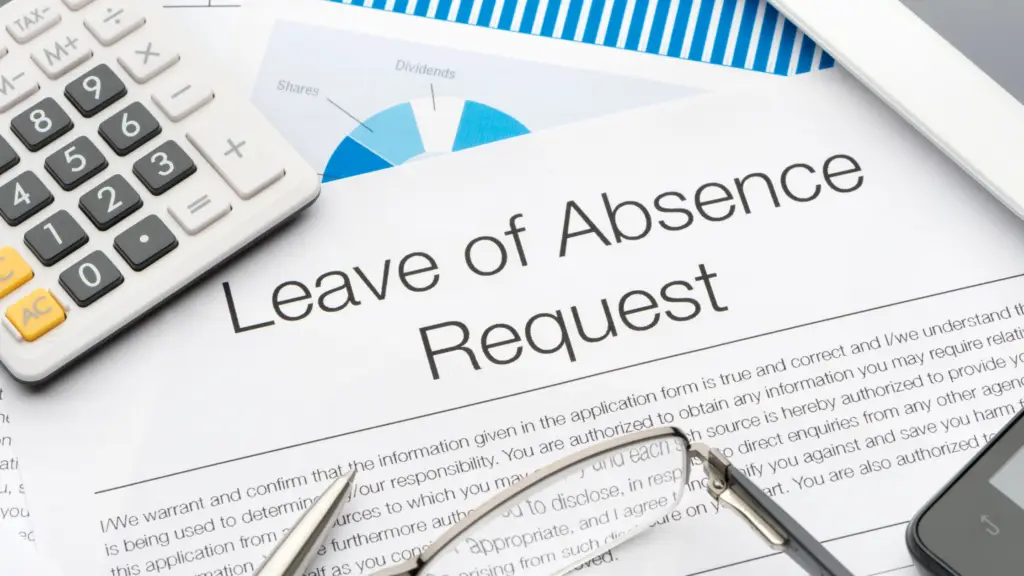
A leave of absence (LOA) is an authorized period of time away from work granted to an employee by their employer. It allows employees to address personal or professional needs that require extended time off beyond their regular vacation or sick leave.
Reasons for a Leave of Absence
- Mandatory Leaves
- Certain circumstances are legally protected and may entitle employees to take leave under federal or state laws, such as:
- Family and Medical Leave Act (FMLA): Up to 12 weeks of unpaid leave for parental leave, medical leave, or to care for a sick family member.
- Military Leave: Service members are entitled to leave for their deployment and return to their previous jobs.
- Jury Duty: Employees can take leave to fulfill their jury duty obligations.
- Certain circumstances are legally protected and may entitle employees to take leave under federal or state laws, such as:
- Voluntary Leaves
- Employers may also offer additional leaves for various reasons, such as:
- Parental leave beyond FMLA
- Medical leave beyond FMLA
- Personal leave for bereavement, moving, or pursuing education
- Sabbatical leave for professional development
- Employers may also offer additional leaves for various reasons, such as:
Do you Get Paid for Leave of Absence?
Mandatory leaves under laws like FMLA or military leave are usually unpaid. However, employers may choose to offer paid leave as a benefit. Voluntary leaves are typically at the employer’s discretion and can be either paid or unpaid depending on the policy and reason for leave.
Length of Leave
The duration of a leave can vary depending on the reason and employer policy. FMLA, for example, allows for 12 weeks of leave, while medical leave might be longer depending on the specific illness or injury.
Can you Work Another Job While on Leave of Absence?
The rules around working another job while on a leave of absence can vary based on your specific situation, company policies, and the terms of your leave. Some leaves of absence, like medical leave or family leave, might have restrictions on outside employment to ensure you’re focused on recovery or caregiving. It’s crucial to review your employment contract, company policies, and the terms of your leave to understand any limitations or restrictions.
However, in certain cases and depending on the nature of your leave, some companies might allow you to work elsewhere during your leave period. It’s best to communicate openly with your employer about your intentions and seek their permission or clarity regarding any regulations.
Whether you can work another job while on a leave of absence depends on several factors:
- Employer policy
- Many employers have policies specifically addressing outside employment during a leave of absence. These policies can be:
- Prohibitive: Some companies entirely forbid working elsewhere while on any leave.
- Restrictive: They may restrict working in a similar field or for a competitor.
- Permissive: They may allow additional employment with no limitations.
- Many employers have policies specifically addressing outside employment during a leave of absence. These policies can be:
Always check your employer’s handbook or consult HR before taking any additional job during a leave.
- Reason for leave
- The type of leave might also influence if you can work another job.
- Legally protected leaves like FMLA: The Family and Medical Leave Act does not prevent employees from working another job while on leave. However, your employer’s policy might still restrict it.
- Company-specific leaves: Check your employer’s policy for specific regulations surrounding your type of leave, like parental leave or sabbatical.
- The type of leave might also influence if you can work another job.
- Potential conflicts
- Consider any potential conflicts between your second job and your primary role, such as:
- Conflicting schedules: Ensure your new job’s hours don’t interfere with your expected return to your original position.
- Non-compete clauses: Some contracts have clauses preventing employees from working for competitors during or after employment.
- Consider any potential conflicts between your second job and your primary role, such as:
- Communication and transparency
Open communication with your employer is crucial. Inform them about your intention to work elsewhere while on leave. Transparency helps avoid any issues or surprises upon your return.
- Focus on your leave’s purpose
Remember the intended purpose of your leave of absence. If it’s for medical reasons, working another job might affect your recovery. Ensure your additional work doesn’t conflict with your well-being or the reason for your leave.
In conclusion, whether you can work another job while on leave depends on various factors. Always prioritize understanding your employer’s policies, the reason for your leave, and potential conflicts. Open communication and transparency are key to a smooth experience during and after your leave.
Can you Collect Unemployment While on Unpaid Leave of Absence?
Whether you can collect unemployment benefits while on an unpaid leave of absence typically depends on the specific circumstances and the regulations in your state or country. Here are some general considerations:
- State Regulations
- Unemployment benefits are regulated at the state level in the United States. Each state has its own eligibility criteria and rules regarding unemployment benefits. Some states may allow individuals on unpaid leave to qualify for benefits if they meet certain conditions.
- Reason for Unpaid Leave
- The reason for the unpaid leave could affect your eligibility for unemployment benefits. If the leave was due to factors beyond your control (layoffs, reduction in hours, etc.), you might be eligible for benefits. However, if you voluntarily took unpaid leave without a valid reason recognized by the unemployment agency, it might impact your eligibility.
- Availability and Willingness to Work
- To receive unemployment benefits, you typically need to be available and actively seeking full-time employment. If you’re on unpaid leave but willing and able to work, you might still qualify for benefits.
- Reporting Requirements
- You’ll likely need to report any income or work you’re doing while on leave when applying for unemployment benefits. This includes reporting any wages earned during the period.
- Review State Guidelines
- It’s essential to review your state’s unemployment agency guidelines or consult with them directly to understand the specific rules and whether your situation qualifies for benefits.
Remember, eligibility for unemployment benefits during an unpaid leave of absence can be complex and depends on various factors, including state laws and the reason for the leave. It’s advisable to contact your state’s unemployment office or seek guidance from a legal professional for specific advice tailored to your situation.
What Happens if Leave of Absence is Denied?
What happens if a leave of absence is denied depends on several factors, including the reason for the leave, your employment status, and whether the denial violates any laws or company policies. Here’s a breakdown of possible scenarios:
Understanding the denial
- Reason for denial
- Employers can legally deny leave requests for various reasons, such as:
- Insufficient notice or lack of supporting documentation.
- Undue hardship on the company due to staffing shortages or critical deadlines.
- Leave request doesn’t comply with the company’s leave policy.
- Requests not covered by protected laws like FMLA.
- Employers can legally deny leave requests for various reasons, such as:
- Employer obligations:
- The employer should provide a clear and specific reason for denial, preferably in writing.
Your next steps
- Ask for clarification:
- If the reason for denial is unclear, ask your employer for further explanation and try to understand their specific concerns.
- Negotiate options:
- Depending on the situation, you can explore alternative arrangements with your employer, such as a shorter leave period, adjusted work schedule, or remote work possibilities.
- Seek legal advice:
- If you believe the denial violates your rights under protected leave laws or your employer’s policy, consider consulting with an employment attorney. They can assess your situation and advise you on your legal options, which might include:
- Challenging the denial: You can file a complaint with the Department of Labor or file a lawsuit against your employer for unlawful leave denial.
- Negotiating a severance: If you decide not to work for the company anymore, you can negotiate a severance package with your employer.
- If you believe the denial violates your rights under protected leave laws or your employer’s policy, consider consulting with an employment attorney. They can assess your situation and advise you on your legal options, which might include:
Important considerations
- Documentation:
- Throughout the process, keep records of all communication with your employer, including emails, written notices, and dates of conversations.
- Emotional well-being:
- Dealing with a denied leave can be stressful. Prioritize your well-being and seek support from friends, family, or a therapist if needed.
- Job search:
- If you decide to leave your job due to the leave denial, begin your job search actively and utilize resources like career centers and online platforms.
Remember, the specific response to a denied leave of absence depends on your unique situation. Taking time to understand the denial, weigh your options, and seek appropriate advice can help you navigate the situation effectively and protect your rights.
Need Legal Advice?
Have you been wrongfully denied a leave of absence? Is your employer violating your rights during your leave? Are you unsure about your legal options surrounding leaves or other workplace issues?
Our experienced employment lawyers at Shaumyan & Derbarseghian, LLP are happy to help. We understand the challenges you face and are dedicated to protecting your rights and advocating for your best interests.
We’re here to listen, answer your questions, and provide the legal support you need. Contact us now for a free legal consultation.

